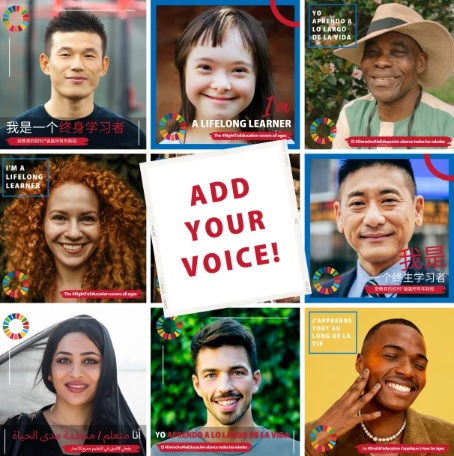العودة

The Right to Education Covers All Ages: Empowering individuals, transforming societies
اليونسكو
2023 - 07 - 27
UNESCO is leading a global campaign to promote lifelong learning. The campaign is called #ImALifelongLearner. To get involved, simply take a photo of yourself and share it on social media with the hashtag #ImALifelongLearner. In your photo, you can explain why you are a lifelong learner or share your experiences with lifelong learning. The #ImALifelongLearner campaign is a great way to show your support for lifelong learning and to inspire others to learn throughout their lives.

UNESCO is leading a global campaign to promote lifelong learning. The campaign is called #ImALifelongLearner. To get involved, simply take a photo of yourself and share it on social media with the hashtag #ImALifelongLearner. In your photo, you can explain why you are a lifelong learner or share your experiences with lifelong learning. The #ImALifelongLearner campaign is a great way to show your support for lifelong learning and to inspire others to learn throughout their lives.
Lifelong Learning for All. In today’s world of rapid technological advancement, generative artificial intelligence, labour market volatility, climate change and demographic transition, learning throughout life is more important than ever.
On the occasion of the launching of the campaign, Audrey Azoulay, UNESCO Director-General said “Rapid technological and social changes as well as massive global challenges require that citizens have access to new learning throughout their lives. The ultimate twenty-first century skill is the ability to learn. I urge governments and the international community to join our efforts and take action to ensure that the right to education is realized for everyone – no matter their age, who they are, or where they live.”
Lifelong learning is essential for success in the 21st century. It is a mindset and a set of skills that can help us adapt to change, create new opportunities, and shape the future. If we embrace lifelong learning, we will be better equipped to meet the challenges of the world ahead.
أحدث المنشورات
القائمة الكاملةاليونسكو
المستقبل على المحك: لماذا الاستثمار في التعليم أمر بالغ الأهمية؟
يسلط هذا التقرير، الذي أعدّته اللجنة التوجيهية الرفيعة المستوى المعنية بالهدف الرابع من أهداف التنمية المستدامة (SDG4) بالتعاون مع الشراكة العالمية من أجل التعليم (GPE) ونُشر في عام 2024، الضوء على الحاجة المُلِحّة لتعزيز الاستثمار في التعليم كوسيلة أساسية لمواجهة التحديات العالمية، بما في ذلك تغيّر المناخ، والتطورات التكنولوجية، والتحوّلات الديموغرافية.
اليونسكو
المدن العربية تتألق في جوائز مدن التعلم لليونسكو لعام 2024
تُحرز المدن العربية تقدمًا كبيرًا في مجال التنمية المستدامة والتعلم مدى الحياة، مع تركيز متزايد على إنشاء بيئات تعليمية شاملة تُسهم في تحقيق الأهداف التنموية المحلية والعالمية. وقد احتفلت جوائز مدن التعلم لعام 2024، التي تُمنح من قِبَل اليونسكو، بهذه الجهود، مبرزةً المدن العربية التي تميزت في بناء مجتمعات تعليمية.
اليونسكو
مؤتمر اليونسكو العالمي الثالث للموارد التعليمية المفتوحة: تعزيز الوصول الشامل إلى المعرفة
انطلق مؤتمر اليونسكو العالمي الثالث للموارد التعليمية المفتوحة (OER) في 19 نوفمبر/تشرين الثاني 2024، في مركز دبي التجاري العالمي في دولة الإمارات العربية المتحدة، ليكون المرة الأولى التي يُستضاف فيها هذا الحدث في العالم العربي. نظّم مؤتمر اليونسكو بالتعاون مع مؤسسة محمد بن راشد آل مكتوم للمعرفة (MBRF)واستقطب أكثر من 500 مشارك ومشاركة من نخبة القادة العالميين، وصنّاع السياسات، وممثلي المؤسسات التعليمية، بما في ذلك وزراء، وأكاديميون، وخبراء من القطاع الخاص. وتركّزت المناقشات على مدار يومين حول تعزيز الاستفادة من الموارد التعليمية المفتوحة والتقنيات الناشئة، بهدف تحقيق وصول عادل وشامل إلى التعليم، وتقليص الفجوة الرقمية على الصعيد العالمي.
اليونسكو
الأمم المتحدة تحتفي في شهر ديسمبر/كانون الأول بحقوق الإنسان، والأشخاص ذوي الإعاقة، واللغة العربية
تُحيي الأمم المتحدة في شهر ديسمبر/كانون الأول ثلاث مناسبات بارزة تُعنى بحقوق الإنسان، وبحقوق الأشخاص ذوي الإعاقة، وباللغة العربيّة، ممّا يجعل هذا الشهر فرصةً عالميّةً للتفكير والعمل. وتقود اليونسكو الجهود لتعزيز التعليم الشامل، وحماية حقوق الإنسان، والاحتفاء بالإرث الثقافيّ واللغويّ للّغة العربيّة، من خلال سلسلة من الفعاليات والمبادرات.